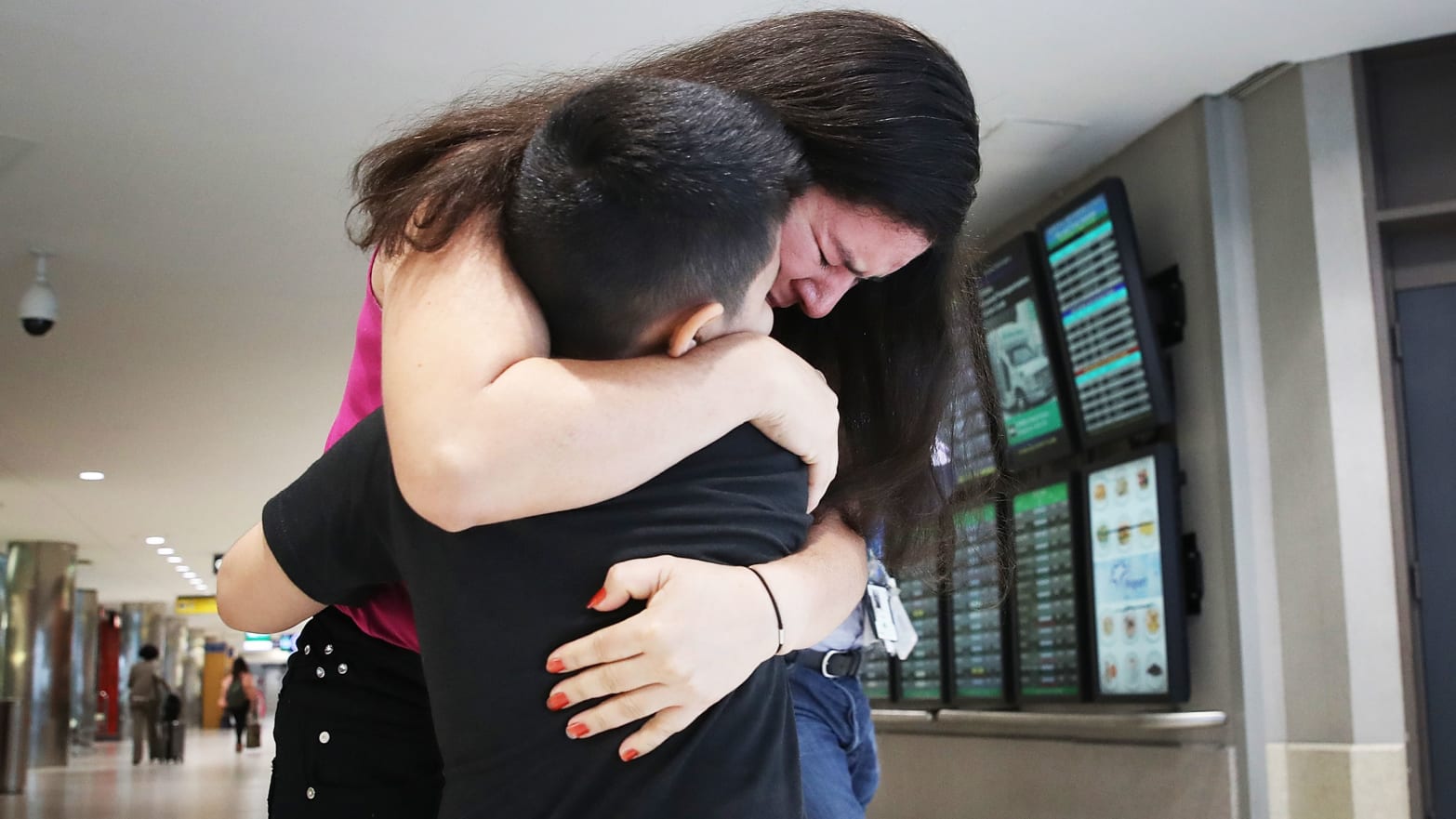Hours before the expiration of a court-ordered deadline to reunify thousands of immigrant children separated from their families at America’s southern border, the Trump administration told reporters on Thursday evening that more than 700 children had yet to be recovered by their parents.
“We are on-track to reunite all eligible parents within ICE custody” by the midnight deadline, Chris Meekins, chief of staff for the Department of Health and Human Services’ Assistant Secretary for Preparedness and Response, told reporters during a conference call. According to court filings submitted on Thursday afternoon, 1,820 children between the ages of five and 18 have been discharged from federal detention. Of those, 1,442 children were reunified with parents in Immigration and Customs Enforcement custody, while another 378 were released under unspecified “appropriate circumstances,” including “aging out,” Meekins said.
But 711 migrant children deemed “potentially eligible” for reunification with their families have yet to be recovered—including 431 children whose parents have already been deported from the United States. Asked how the government planned on reuniting those children with their parents, Matthew Albence, the executive associate director of Immigration and Customs Enforcement’s deportations unit, told reporters that the U.S. government had no plans to reunite them on American soil.
“We don’t keep track of individuals who have been deported,” Albence said, echoing his remarks after the expiration of the first court-mandated deadline to reunite children under the age of five with their families.
Advocacy groups accused the Trump administration of playing fast and loose with its determination of which children and parents were “eligible” for reunification, dismissing the criteria as arbitrarily contrived to meet the deadline.
“The government’s not even claiming that they’re attempting to reunify all those families,” Lee Gelernt, deputy director of the ACLU’s Immigrants’ Rights Project, said. “They unilaterally declared who was eligible.”
Roughly a third of parents separated from their children at the border were deemed “eligible” for reunification with their children. In addition to the 463 parents who were deported without their children, nearly 1,000 were deemed ineligible due to an inability to confirm a legal relationship, illness, or a failed criminal background checks—including arrest for attempting to cross the border with their child in the first place.
According to the government’s latest filing, of the 711 “potentially eligible” migrant children who have not been reunited with their families, 120 have parents who have waived their rights to reunification before deportation—a decision Albence said was the goal of making the dangerous journey from Central America into the United States all along.
“After paying smugglers five thousand, six thousand, ten thousand dollars to make that dangerous journey across Central America and Mexico,” Albence said, “they’re not going to bring them back now.”
The reunification gap comes 30 days after U.S. District Judge Dana Sabraw ordered the Trump administration “to address a chaotic circumstance of the government’s own making” by reuniting families that had been separated in violation of their due-process rights. The government’s actions, Sabraw ruled, “belie measured and ordered governance, which is central to the concept of due process enshrined in our Constitution.”
Sabraw ruled that, “unless there is a determination that the parent is unfit or presents a danger to the child, or the parent... declines to be reunited with the child,” all of the estimated 2,700 children separated from their families had to be reunited by midnight on Thursday.
But beyond a constitutional crisis, advocates said, the family separation policy that resulted from President Donald Trump’s “zero-tolerance” policy of separating immigrant children from their parents at the American border to discourage illegal immigration has been a moral crisis.
“The continued trauma and injustice facing these families is a human rights crisis that this administration brought upon itself,” Michelle Brané, director of Women’s Refugee Commission’s migrant rights and justice program, told The Daily Beast in a statement. “These traumatic separations are unacceptable, and it is unconscionable that it is now taking weeks and potentially months to reunite children with their parents.”

